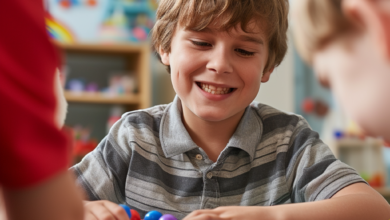- Individualized Learning
- Sensory-Based Exploration
- Prepared Environment
- Development of Independence and Social Skills
- Challenges in Implementation
- Need for Adaptation and Collaboration
In the evolving landscape of education, inclusive education stands as a beacon of progress, aiming to cater to the diverse needs of all learners, including those with special needs. Among the pedagogical approaches adopted worldwide, the Montessori method, pioneered by Dr. Maria Montessori in the early 20th century, emphasizes self-directed activity, hands-on learning, and collaborative play. This method encourages children to make creative choices in their learning, while the classroom and the teacher offer age-appropriate activities to guide the process. The question that arises, however, is whether the Montessori method can be effectively adapted to support children with special needs within an inclusive educational framework.
The Montessori method is fundamentally designed around the principle of observing children to tailor the educational approach to each child’s needs and interests. This individualized approach seems inherently suited to inclusive education, where the goal is to accommodate a wide range of learning styles and abilities. The method’s emphasis on sensory-based learning and self-paced exploration can be particularly beneficial for children with special needs, who often thrive in environments that allow them to learn at their own pace and in their own way.
Children with special needs, including those with developmental delays, autism spectrum disorders, sensory processing disorders, and attention deficit hyperactivity disorder (ADHD), can face unique challenges in traditional educational settings. These challenges can include difficulties with communication, social interaction, sensory integration, and executive functioning. The Montessori environment, with its structured yet flexible approach, can provide these children with a sense of order and predictability while still offering the freedom to explore and engage with materials that capture their interest.
The quest for effective inclusive education models brings various pedagogical methods under scrutiny, with the Montessori method emerging as a potentially transformative approach. Developed by Dr. Maria Montessori, this method emphasizes self-directed activity, hands-on learning, and collaborative play. But does it hold promise for children with special needs? Let’s explore this question under seven key subtitles.
1. The Essence of Inclusive Education and the Montessori Philosophy
Inclusive education seeks to accommodate all learners, creating an environment where diversity in learning is not just accepted but celebrated. The Montessori philosophy, with its focus on individualized learning, seems inherently compatible with this aim. Observing children to tailor the educational experience to each child’s needs and interests is a cornerstone of the Montessori approach, suggesting a natural alignment with the goals of inclusive education.
2. Benefits for Children with Special Needs
The Montessori method’s individualized, sensory-based learning and self-paced exploration can offer significant advantages for children with special needs. Its environment and materials, designed to cater to various learning styles and abilities, can help these children engage in meaningful learning experiences. For those with developmental delays, autism, sensory processing disorders, and ADHD, the Montessori setting can provide a supportive backdrop for growth and development.
3. The Prepared Environment: A Supportive Learning Space
A key feature of the Montessori method is its carefully prepared environment, designed to be orderly and accessible, encouraging exploration and independence. For special needs children, this environment can be particularly beneficial, offering materials that cater to their sensory preferences and learning needs. Adaptations to this environment ensure that it remains supportive and accessible to all learners.
4. Fostering Independence and Self-Regulation
The Montessori method promotes independence and self-regulation, essential skills for all children, including those with special needs. Through practical life exercises, children learn to care for themselves and their surroundings, fostering a sense of responsibility and self-esteem. These exercises can be adapted to meet the individual abilities of each child, ensuring they are both challenging and achievable.
5. Social Skills Development in a Mixed-Age Setting
One of the unique aspects of the Montessori method is its use of mixed-age classrooms, which can be particularly advantageous for children with special needs. This setting allows for natural mentoring relationships to develop between older and younger children, promoting social skills, empathy, and a sense of community. It also helps in reducing the stigma often associated with special needs by fostering an environment of acceptance and understanding.
6. Challenges and Considerations for Implementation
While the Montessori method holds promise for inclusive education, its implementation is not without challenges. Teachers need specialized training to adapt the approach to the needs of children with special needs effectively. Moreover, the success of this method depends on ongoing collaboration with parents, therapists, and other professionals to ensure that the educational plan is comprehensive and addresses all aspects of a child’s development.
7. Adapting the Montessori Method for Accessibility
To fully serve children with special needs, the Montessori method may require modifications. This could involve adapting materials to accommodate physical disabilities, selecting activities that align with sensory needs, or adjusting the complexity of tasks. Collaboration with specialists can provide valuable insights into individual modifications, ensuring that the Montessori method remains a viable option for inclusive education.
The Montessori method, with its emphasis on individualized learning and a supportive community, offers a promising framework for inclusive education. Its adaptability and focus on the whole child can effectively meet the diverse needs of children with special needs. However, achieving this potential requires a commitment to specialized training, collaborative planning, and ongoing adaptation. With these elements in place, the Montessori method can indeed provide a nurturing and empowering educational experience for all children.
One of the core components of the Montessori method is the prepared environment, which is designed to be orderly, aesthetically pleasing, and scaled to the child’s size. This environment includes a range of developmentally appropriate materials that encourage hands-on learning and exploration. For children with special needs, the prepared environment can be particularly supportive, as it allows them to engage with materials that meet their sensory preferences and learning needs. For example, children with sensory processing disorders may benefit from materials that offer tactile feedback or allow for repetitive motions, which can be soothing and help them focus on learning tasks.






3 Comments